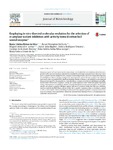Por favor, use este identificador para citar o enlazar este ítem:
http://www.alice.cnptia.embrapa.br/alice/handle/doc/979826Registro completo de metadatos
| Campo DC | Valor | Lengua/Idioma |
|---|---|---|
| dc.contributor.author | SILVA, M. C. M. da | pt_BR |
| dc.contributor.author | SARTO, R. P. del | pt_BR |
| dc.contributor.author | LUCENA, W. A. | pt_BR |
| dc.contributor.author | RIGDEN, D. J. | pt_BR |
| dc.contributor.author | TEIXEIRA, F. R. | pt_BR |
| dc.contributor.author | BEZERRA, C. de A. | pt_BR |
| dc.contributor.author | ALBUQUERQUE, E. V. S. | pt_BR |
| dc.contributor.author | GROSSI DE SA, M. F. | pt_BR |
| dc.date.accessioned | 2017-03-22T23:48:19Z | - |
| dc.date.available | 2017-03-22T23:48:19Z | - |
| dc.date.created | 2014-02-13 | pt_BR |
| dc.date.issued | 2013 | pt_BR |
| dc.identifier.citation | Journal of Biotechnology, v. 167, p. 377-385, 2013. | pt_BR |
| dc.identifier.uri | http://www.alice.cnptia.embrapa.br/alice/handle/doc/979826 | pt_BR |
| dc.description | Numerous species of insect pests attack cotton plants, out of which the cotton boll weevil (Anthonomus grandis) is the main insect in Brazil and must be controlled to avert large economic losses. Like other insect pests, A. grandis secretes a high level of -amylases in the midgut lumen, which are required for digestion of carbohydrates. Thus, -amylase inhibitors (-AIs) represent a powerful tool to apply in the control of insect pests. Here, we applied DNA shuffling and phage display techniques and obtained a combinatorial library containing 108 ˛-AI variant forms. From this library, variants were selected exhibiting in vitro affinity for cotton boll weevil -amylases. Twenty-six variant sequences were cloned into plant expression vectors and expressed in Arabidopsis thaliana. Transformed plant extracts were assayed in vitro to select specific and potent -amylase inhibitors against boll weevil amylases. While the wild type inhibitors, used to create the shuffled library, did not inhibit the A. grandis -amylases, three -AI mutants, named -AIC3, -AIA11 and -AIG4 revealed high inhibitory activities against A. grandis -amylases in an in vitro assay. In summary, data reported here shown the potential biotechnology of new ˛-AI variant genes for cotton boll weevil control. | pt_BR |
| dc.language.iso | eng | eng |
| dc.rights | openAccess | eng |
| dc.subject | Alfa-amylase inhibitors | pt_BR |
| dc.subject | In vitro molecular evolution | pt_BR |
| dc.title | Employing in vitro directed molecular evolution for the selection of α-amylase variant inhibitors with activity toward cotton boll weevil enzyme. | pt_BR |
| dc.type | Artigo de periódico | pt_BR |
| dc.date.updated | 2017-03-22T23:48:19Z | pt_BR |
| dc.subject.thesagro | Anthonomus Grandis | pt_BR |
| dc.subject.nalthesaurus | DNA shuffling | pt_BR |
| dc.subject.nalthesaurus | insect control | pt_BR |
| riaa.ainfo.id | 979826 | pt_BR |
| riaa.ainfo.lastupdate | 2017-03-22 | pt_BR |
| dc.contributor.institution | MARIA CRISTINA MATTAR DA SILVA, CENARGEN | pt_BR |
| dc.contributor.institution | RAFAEL PERSEGHINI DEL SARTO, UNB | eng |
| dc.contributor.institution | WAGNER ALEXANDRE LUCENA, CNPA | eng |
| dc.contributor.institution | DANIEL JOHN RIGDEN, UNIVERSITY OF LIVERPOOL | eng |
| dc.contributor.institution | FABÍOLA RODRIGUES TEIXEIRA | eng |
| dc.contributor.institution | CAROLINE DE ANDRADE BEZERRA, UNIVERSIDADE CATÓLICA DE BRASÍLIA | eng |
| dc.contributor.institution | ERIKA VALERIA SALIBA ALBUQUERQUE FR, CENARGEN | eng |
| dc.contributor.institution | MARIA FATIMA GROSSI DE SA, CENARGEN. | eng |
| Aparece en las colecciones: | Artigo em periódico indexado (CENARGEN)  | |
Ficheros en este ítem:
| Fichero | Descripción | Tamaño | Formato | |
|---|---|---|---|---|
| 1s2.0S016816561300312Xmain.pdf | 1,68 MB | Adobe PDF |  Visualizar/Abrir |









